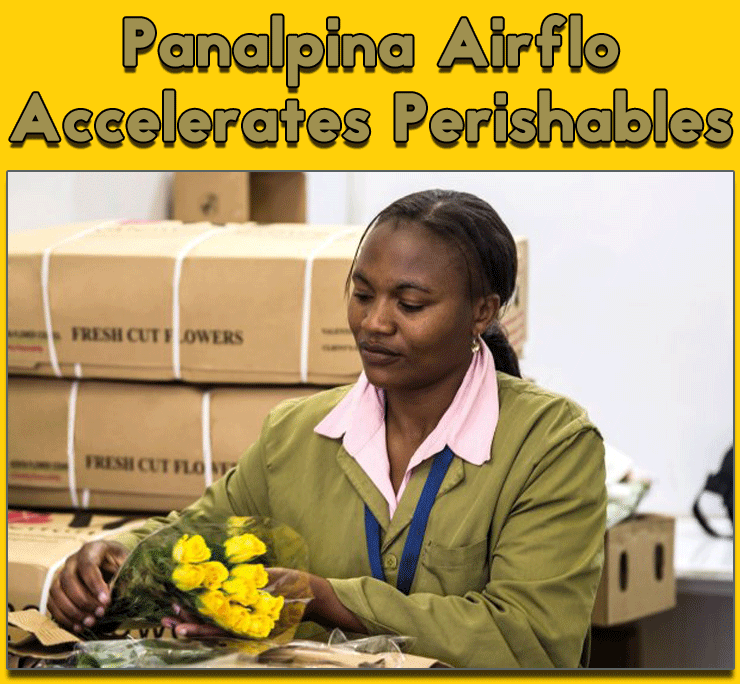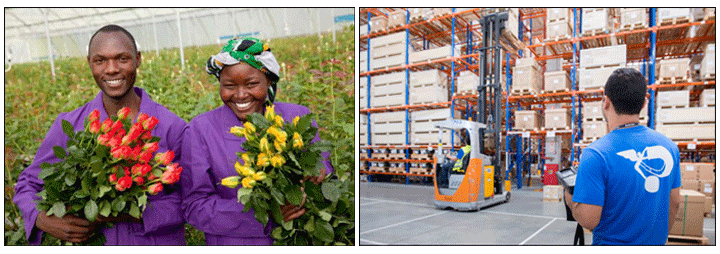 |
In
an air freight industry characterized by overcapacity
and struggles to cope with macro headwinds and technological
trends such as miniaturization, 3D printing, and the
commoditization of technologies, which has reduced surges
in demand for ‘must-have’ products, finding
verticals that offer stable and profitable sources of
cargo has become increasingly difficult. But,
according to Panalpina, one such source of succor is
the perishables business, defined as products that are
time and temperature sensitive.
Last November, the Swiss
forwarding giant expanded its perishables logistics
business with the acquisition of a majority stake in
Airflo, Kenya’s second largest airfreight forwarder
and a specialist in the worldwide export of perishables
such as fresh flowers and vegetables flown from Africa
into key European markets, most often via Amsterdam
Airport Schiphol.
Airflo employs over 150
staff in Nairobi and the Netherlands, organizing up
to 1,500 temperature-controlled shipments each week
and more than 40,000 tons of flowers each year, so its
addition to Panalpina’s air freight forwarding
division was something of a coup. Indeed, it is one
of the reasons why Lucas Kuehner, global head of airfreight,
believes Panalpina will continue to grow its air freight
volumes by around 5 percent this year in line with Q1
performance, even as global air freight markets remain
flat.
 |
Explaining
the rationale behind Panalpina’s decision to focus
more closely on the perishables trade, Kuehner said
fresh products were in demand around the globe all year
long, and successfully forwarding them required a logistics
provider to ensure products such as flowers, fruits,
and fish were safely and efficiently steered through
the cool chain to their final destination.
“As consumer behavior
changes, markets shift, and global demand grows, Panalpina’s
specialists provide ‘field-to-shelf’ services
to make sure shipments arrive in the right place, at
the right time, in peak condition,” he said.
“It requires a lot
of experience, which suits us. This is one of the reasons
why perishables as a market is so attractive and why
we’re diversifying into it.
“It is also a growing
market. Along with the purchase of Airflo, focusing
on perishables was one of the wise decisions we made
last year when the oil and gas sector cut projects,
which was tough for us.
“The consumption
of more perishables is a macro trend that will continue.
It is mixed in with urbanization and more people globally
moving into the middle class. They are demanding more
from food and other products that require careful temperature
control.”
Panalpina transports perishables
for a wide range of customers, from large- and medium-sized
companies that work across borders in global and regional
markets to small local businesses. Customers include
retailers, export and import traders, producers, florists,
food chains, and restaurants. Globally, fish is the
top commodity moved by air, closely followed by fruits,
flowers, and vegetables.
The perishables trade
is also attractive because of the nature of the trade’s
flows. Although it is complex and global, most of the
perishables trade moves from south to north, with South
America and Africa standing as two key export regions,
especially for flowers. Fish is also a major cargo on
intra-Asia lanes and from Europe to Asia. Important
trade lanes for Panalpina are Columbia and Ecuador to
the U.S. as well as Kenya to the Netherlands and the
UK for flowers.
“We have a global
footprint so we can offer end-to-end solutions,”
said Kuehner. “Because perishables are often flown
from places like South America and Africa, which are
predominantly import markets, filling planes with them
for the backhaul makes a lot of sense.“Generally,
margins are lower within the perishables sector, however
this is offset by the critical mass, meaning the size
of shipments, as well as lean and efficient operations
and value-added services on our part. And I think as
e-commerce retailers look to sell more perishables,
it will grow even faster.”
SkyKing |





